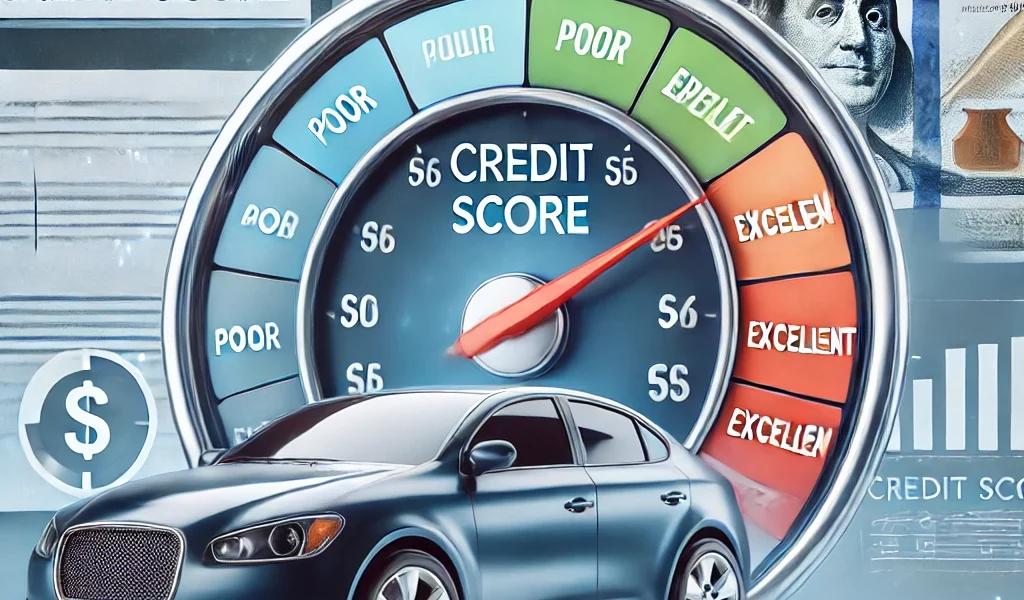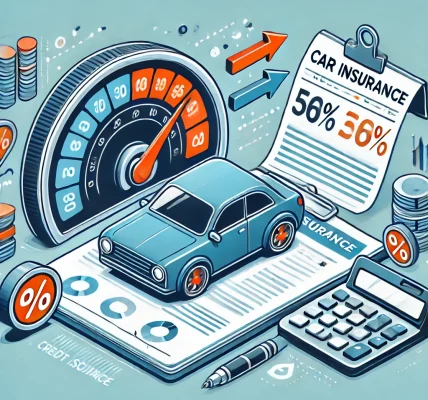Car insurance rates can vary significantly based on several factors, and one crucial factor that many drivers may not be aware of is their credit score. While it might seem unrelated, insurers often use credit scores to assess risk and determine premium rates. Understanding how your credit score impacts your car insurance rates can help you take proactive steps to manage costs effectively.
This article will explore the relationship between credit scores and car insurance rates, why insurers consider them, and how you can improve your score to lower your premiums.
1. Understanding Credit Scores and How They Work
A credit score is a numerical representation of your creditworthiness, typically ranging from 300 to 850. It is calculated based on factors such as your payment history, credit utilization, length of credit history, types of credit, and recent inquiries.
Factors That Influence Your Credit Score:
- Payment History (35%) – Whether you pay your bills on time.
- Credit Utilization (30%) – The amount of credit used compared to your total available credit.
- Length of Credit History (15%) – How long you have been using credit.
- Types of Credit (10%) – A mix of credit cards, loans, and other credit accounts.
- Recent Credit Inquiries (10%) – New applications for credit accounts.
A higher credit score indicates responsible financial behavior, while a lower score suggests potential risk to lenders and insurers.
2. Why Do Insurance Companies Consider Credit Scores?
Insurance providers analyze credit scores to assess how likely a policyholder is to file a claim. Studies have shown a correlation between lower credit scores and a higher probability of filing insurance claims. As a result, insurers may charge higher premiums to individuals with lower credit scores to mitigate risk.
Key Reasons Insurers Use Credit Scores:
- Risk Assessment: Lower credit scores are statistically linked to a higher number of claims.
- Financial Responsibility: People with good credit are seen as more responsible with their finances, which often translates to responsible driving behavior.
- Claim Frequency and Cost: Insurers believe that those with lower credit scores tend to file more claims, leading to higher costs for the company.
3. How Your Credit Score Affects Car Insurance Rates
Higher Credit Score = Lower Premiums
Drivers with excellent credit (750 and above) typically enjoy lower insurance premiums. They are perceived as low-risk, meaning insurers are more willing to offer competitive rates.
Lower Credit Score = Higher Premiums
If you have a poor credit score (below 600), insurers may view you as high-risk, leading to increased premiums. In some cases, your credit score could impact your ability to qualify for certain policies altogether.
Example of Credit Score Impact on Insurance Rates:
| Credit Score Range | Estimated Annual Premium* |
|---|---|
| 750+ (Excellent) | $1,200 |
| 700-749 (Good) | $1,400 |
| 650-699 (Fair) | $1,800 |
| 600-649 (Poor) | $2,400 |
| Below 600 (Very Poor) | $3,000+ |
Note: These are estimated values and actual premiums may vary based on other factors such as driving history and location.
4. How to Improve Your Credit Score to Lower Insurance Costs
If your credit score is affecting your car insurance rates, taking steps to improve it can help lower your premiums over time.
Tips to Improve Your Credit Score:
- Pay Bills on Time: Timely payments improve your credit history and score.
- Reduce Credit Card Balances: Keep your credit utilization below 30% of your total limit.
- Avoid Opening Too Many Accounts: Too many hard inquiries can temporarily lower your score.
- Check Your Credit Report for Errors: Dispute any inaccuracies to ensure your score is accurate.
- Maintain Older Credit Accounts: A longer credit history positively affects your score.
- Diversify Your Credit Mix: Having different types of credit (e.g., credit cards, loans) can help improve your score.
5. Other Factors That Affect Your Car Insurance Rates
While credit score plays a significant role, insurance companies also consider several other factors when determining your car insurance premium.
Common Factors Influencing Car Insurance Rates:
- Driving Record: Accidents and traffic violations can increase premiums.
- Age and Experience: Younger drivers typically pay more due to inexperience.
- Location: Urban areas usually have higher rates due to traffic congestion and crime.
- Type of Vehicle: Luxury and sports cars often have higher premiums.
- Annual Mileage: More miles driven can mean higher risk, affecting your rates.
6. Can Insurance Companies Use Credit Scores in Every State?
Not all states allow insurers to use credit scores to determine car insurance rates. Some states have regulations in place to limit or prohibit this practice.
States That Restrict or Ban the Use of Credit Scores:
- California – Prohibits using credit scores for determining auto insurance rates.
- Hawaii – Bans insurers from considering credit scores.
- Massachusetts – Does not allow credit scores to be a factor in insurance pricing.
- Michigan – Heavily restricts the use of credit-based insurance scores.
If you live in a state that allows credit-based insurance pricing, working on your credit score is an essential step in reducing your premium.
7. What to Do If Your Credit Score Is Hurting Your Car Insurance Rates
If your credit score is negatively impacting your car insurance rates, consider the following actions:
- Ask for Discounts: Check if you qualify for other discounts (e.g., safe driver, multi-policy, good student).
- Consider a Different Insurer: Some companies rely less on credit scores than others.
- Improve Your Credit Score: Use the tips mentioned earlier to gradually increase your score.
- Request a Re-Evaluation: Once your credit score improves, ask your insurer to reassess your rates.
Conclusion
Your credit score plays a crucial role in determining your car insurance rates, with lower scores often leading to higher premiums. By understanding how insurers use credit scores and taking proactive steps to improve your financial standing, you can reduce your insurance costs while maintaining proper coverage.
To get the best rates, focus on improving your credit health, compare quotes from multiple insurers, and explore available discounts. By staying informed and making smart financial choices, you can enjoy lower car insurance premiums without compromising on protection.




